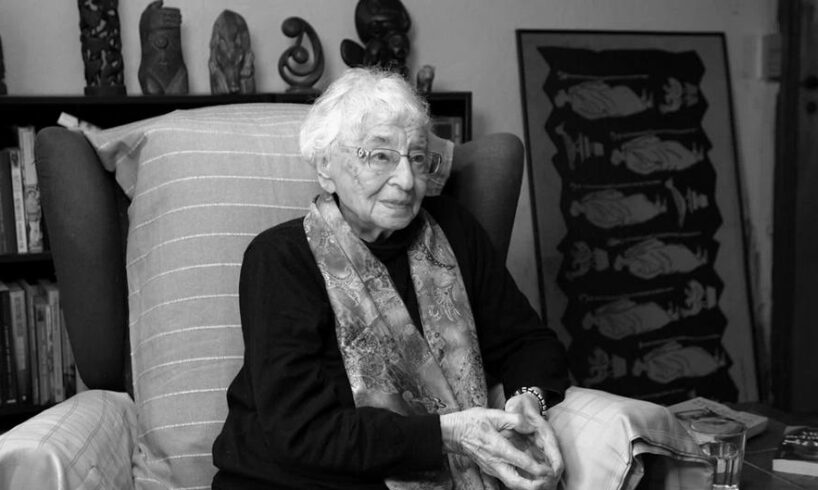
South African journalist Ruth Weiss died in Denmark on September 5, 2025. She left behind a legacy that inspired many. “Throughout her life, Ruth Weiss drew on the immeasurable suffering of the Holocaust and her experiences under apartheid in South Africa to formulate an enduring educational mission for us all: Do not divide the world into ‘us and you,’ but stand up for the ‘us’ of humanity,” Wolfram Weimer, Germany’s Minister of State for Culture and the Media, said.
At the age of 101, the Jewish journalist, writer and human rights activist passed away in Denmark, surrounded by her family.
Her life’s work continues to inspire with the message of tolerance and humanity, Anni Kropf of the Ruth Weiss Society, an association of friends and supporters named after her, told DW.
“We knew her for different lengths of time, but she immediately captivated every one of us with her warm manner when we first met her. Her flawless memory and precise analyses never ceased to amaze us. Her subtle humor surprised many,” Kropf said.
Until the end, Weiss was a sought-after contemporary witness who willingly shared her experiences — and her life was rich in experiences.
Ruth Weiss was born Ruth Löwenthal on July 26, 1924, to Jewish parents in Fürth, Franconia. Her family was living in Nuremberg when the Nazis came to power. They quickly felt the rising anti-Jewish sentiment. Her father lost his job and emigrated to relatives in South Africa in 1933. Her mother followed with Weiss and her sister in 1936.
Escape into exile in South Africa
They moved to a white working-class neighborhood in Johannesburg and young Ruth quickly realized that she was not welcome there either. From the outset, she was confronted with the anti-Semitism of white South African fascists and brutal racism against Black people. Her experiences made it impossible to accept the marginalization brought about by apartheid in South Africa.
Apartheid was established by the state in 1948 and was the authoritarian self-declared domination of white people of European descent over all other groups. In this white-dominated country, “we had the right skin color,” Ruth Weiss told DW in 2024, “but the wrong religion.”
Ruth Weiss and her sister Margot in Johannesburg in 1936Image: Basel Afrika Bibliographien/Ruth Weiss Gesellschaft
After graduating from high school, Weiss worked at a law firm. During this time, she began to meet other like-minded people who opposed apartheid in a cultural association, including her future husband, journalist Hans Weiss. Under his name, she began to write for European media about the atrocities of apartheid and the growing resistance of Black South Africans.
Maintaining a critical perspective
Weiss advised journalists to always maintain a critical perspective. “We hope media professionals worldwide will take Ruth Weiss’s journalistic courage and integrity as an example,” Katharina Weiß of the NGO Reporters Without Borders told DW. “As a contemporary witness, she highlighted racism, apartheid and anti-Semitism and leaves behind a rich journalistic legacy focused on justice and human rights.”
“With Weiss’s passing, we have lost not only a sincere friend of Africa, but also a moral authority who always reminded us to take responsibility and learn from history,” said Dr. Uschi Eid, president of the German Africa Foundation.
.
South Africa: 30 years after abolishing apartheid
To view this video please enable JavaScript, and consider upgrading to a web browser that supports HTML5 video
When her marriage failed in the 1960s, her journalistic career took off. She became a renowned financial journalist and political reporter who was openly sympathetic to the independence movements in Zambia and Zimbabwe as well as anti-apartheid efforts in South Africa.
Weiss used her position as a recognized journalist to protest the injustice of apartheid policy in South Africa. She established contact with numerous figures in the African independence movements, including Robert Mugabe, the future dictator of Zimbabwe, Zambia’s former president Kenneth Kaunda, and South Africa’s liberation hero Nelson Mandela, whom she interviewed before his arrest in 1963.
Selfless ‘connoisseur of Africa’
Since 2020, Ruth Weiss had served as honorary president of the PEN Center for German-speaking Authors Abroad. “She was an intimate connoisseur of Africa, a source of knowledge for other journalists and activists,” PEN Secretary General Helga Druxes told DW. “She was characterized by her curiosity about people, her sincerity, her humor and, not least, her modesty.”
“She was selfless and helpful,” said Deborah Vietor-Engländer, a PEN member and president of the Alfred Kerr Foundation, in an interview with DW. She will be remembered as “a fighter who not only solved her own problems, but also tried to fight on the side of Black people in South Africa.”
.
The apartheid regime in South Africa oppressed the Black majority of the population – the picture shows unrest before the 1994 elections, which Mandela’s ANC wonImage: ALEXANDER JOE/AFP/Getty Images
In 1966, Weiss moved to London, where she wrote for The Guardian, among others. From 1975 to 1978, she worked in DW’s Africa editorial office in Cologne. In 1980, she moved to Harare, where she witnessed Zimbabwe’s independence. “Many Europeans still think that they live in colonial conditions and that African countries are merely suppliers of wealth,” Ruth Weiss told DW in a previous interview. “That has to change.”
In 2005, she was nominated for the Nobel Peace Prize as one of “1000 Peacewomen Across the Globe.” A secondary school in Aschaffenburg was also named after her in 2010, and the Jewish Museum in Cape Town honored her with an exhibition in 2014.
She also received Germany’s Federal Cross of Merit First Class and in 2023 the prestigious South African National Order “Companions of O.R. Tambo,” named after Oliver Reginald Tambo, former president of the African National Congress. In April 2024, she was awarded the Grand Cross of the Order of Merit of the Federal Republic of Germany.
‘Remembering means acting’ – also in the Middle East
Weiss most recently lived with her son’s family in Denmark. Even in her old age, she continued to write non-fiction books and novels. Her last work, “Remembering Means Acting,” was published in August 2025. In it, she expressed her unambiguous opinion on the escalation in the Middle East: “Both peoples, the Jewish and the Arab-Palestinian, have the right to live in Palestine!” She continues: “The hatred that continues to grow with every new death will only prolong the tragedy for both peoples.” However, Weiss was never one to give up hope: She wrote that she believed the conflict will be resolved at some point.
In 2023, on Holocaust Remembrance Day in the state parliament of North Rhine-Westphalia, Ruth Weiss said, “I learned that racism, anti-Semitism and misanthropy know no boundaries, that this is an injustice that must be fought everywhere.”
Ruth Weiss has visited schools many times in her life to warn against anti-SemitismImage: Andreas Keuchel/dpa/picture alliance
Note: This article is based on an article from July 25, 2024. Josephine Mahachi contributed to this article, which was originally written in German.





